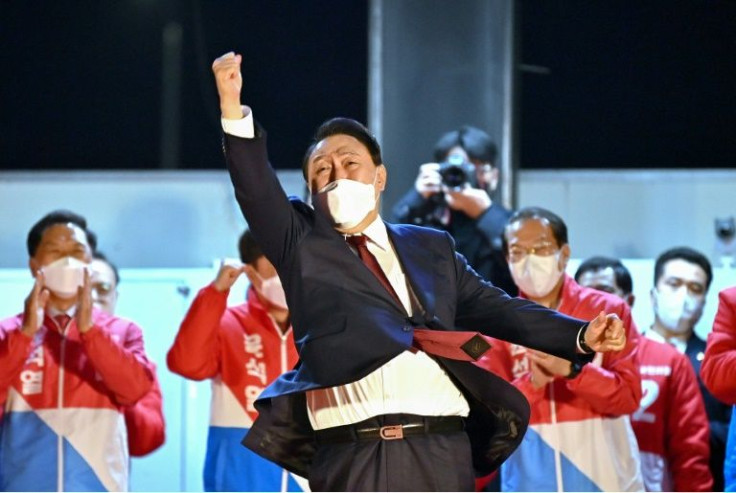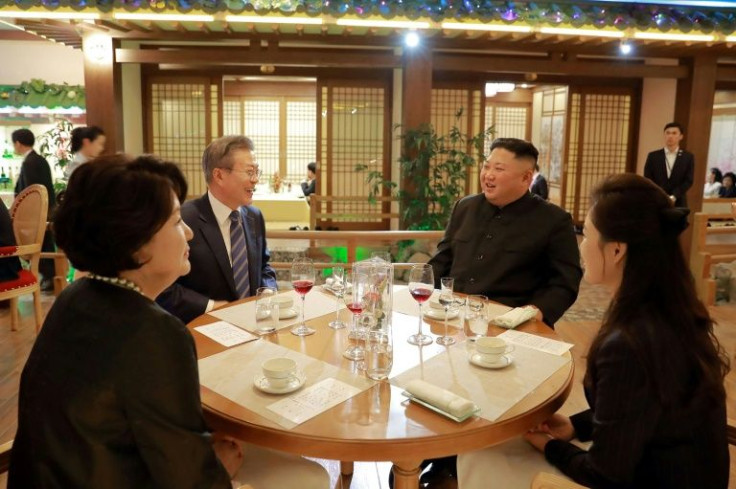S. Korea's New President To Teach 'Rude Boy' Kim Jong Un Some Manners
Threatening a pre-emptive strike, swiftly responding to missile tests, and telling "rude boy" leader Kim Jong Un to behave: South Korea's next president looks set to get tough on the nuclear-armed North, analysts say.
For the last five years Seoul has pursued a policy of engagement with Pyongyang, brokering high-level summits between Kim and then-US president Donald Trump while reducing joint US military drills the North sees as provocative.
For president-elect Yoon Suk-yeol -- who won a close election by a razor-thin margin Thursday -- this "subservient" approach has been a manifest failure.
The outgoing administration of President Moon Jae-in "volunteered to play middleman between the US and North Korea but was dumped by both in the end," Yoon said in a pre-election Facebook post.
Since the start of the year, Pyongyang has conducted a record-breaking nine weapons tests, including of banned hypersonic and medium range ballistic missiles.
After the North test-fired what it claimed was a reconnaissance satellite component Saturday -- Seoul said it was a disguised ballistic missile -- Yoon, 61, said the youthful Kim needed to be taken in hand.
"If you give me a chance, I will teach him some manners," he said.

On the campaign trail, he said Kim was a "rude boy", and promised that once he was in power, he would make the North Korean leader "snap out of it".
The former prosecutor has threatened a pre-emptive strike on the North "if necessary" -- something analysts say is wildly unrealistic and dangerous.
Even so, Yoon vowed Thursday to "sternly deal with the North's illegal and irrational acts," in his first comments as president-elect.
"Under Yoon, we'll probably see efforts to reset inter-Korean relations," Soo Kim of the RAND Corporation told AFP.
Instead of dialogue and engagement, she said, Yoon will take a harder line, having already called for more joint drills with the US.

"It's a departure from the Moon administration's prioritisation of inter-Korean engagement, to say the least," she added.
The "one-way love" displayed under Moon will come to an end, said Professor Park Won-gon of Ewha Womans University.
"Yoon will certainly want to put the issue of denuclearisation in the agenda," said Park, in contrast to the more piecemeal diplomacy pursued by his liberal predecessor.
"It's highly likely that North Korea will say no."
Yoon has even suggested buying an additional THAAD missile system from the US to counter the North -- despite risks that it could prompt new economic retaliation from China, Seoul's biggest trade partner.
"Seoul must also retool its complex relationship with Beijing," Yoon said in a policy statement in Foreign Affairs last month.
President Moon met with leader Kim Jong Un four times, and brokered high-profile talks between Pyongyang and Washington.
But negotiations collapsed in 2019, and diplomacy has stalled as Pyongyang has ramped up weapons testing and threatened to abandon a self-imposed moratorium on testing long-range missiles and nuclear weapons.
Yoon has not ruled out the possibility of dialogue with Pyongyang, but analysts say his hawkish position puts him on a completely different footing and significantly reduces the prospect of substantive engagement.
Pyongyang will judge it has "nothing to gain" from talking to a hardline South Korean government, Hong Min, a researcher at the Korea Institute for National Unification told AFP.
Keeping tensions on the peninsula high will work in Pyongyang's favour, Hong added, allowing it to keep momentum on Kim's avowed program of military modernisation.
"North Korea will pick up the tempo of its nuclear and missile development and use the hawkish South Korean government to justify its actions."
© Copyright AFP 2024. All rights reserved.





















